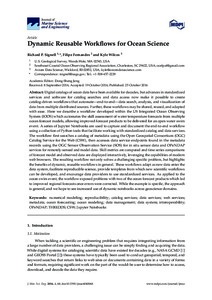Dynamic Reusable Workflows for Ocean Science.

View/
Average rating
votes
Date
2016Author
Signell, Richard P.
Fernandes, Filipe
Wilcox, Kyle
Metadata
Show full item recordAbstract
Digital catalogs of ocean data have been available for decades, but advances in standardized
services and software for catalog searches and data access now make it possible to create
catalog-driven workflows that automate—end-to-end—data search, analysis, and visualization of
data from multiple distributed sources. Further, these workflows may be shared, reused, and adapted
with ease. Here we describe a workflow developed within the US Integrated Ocean Observing
System (IOOS) which automates the skill assessment of water temperature forecasts from multiple
ocean forecast models, allowing improved forecast products to be delivered for an open water swim
event. A series of Jupyter Notebooks are used to capture and document the end-to-end workflow
using a collection of Python tools that facilitate working with standardized catalog and data services.
The workflow first searches a catalog of metadata using the Open Geospatial Consortium (OGC)
Catalog Service for the Web (CSW), the.....
Resource URL
https://www.mdpi.com/2077-1312/4/4/68Journal
Journal of Marine Science and EngineeringVolume
4Issue
Article 68Page Range
12pp.Document Language
enSustainable Development Goals (SDG)
14.AMaturity Level
TRL 8 Actual system completed and "mission qualified" through test and demonstration in an operational environment (ground or space)Best Practice Type
Manual (incl. handbook, guide, cookbook etc)DOI Original
https://doi.org/10.3390/jmse4040068Citation
Signell, R.P.; Fernandes, F. and Wilcox, K. (2016) Dynamic Reusable Workflows for Ocean Science. Journal of Marine Science and Engineering, 4: 68, 12pp. DOI: https://doi.org/10.3390/jmse4040068Collections
The following license files are associated with this item:
 Repository of community practices in Ocean Research, Applications and Data/Information Management
Repository of community practices in Ocean Research, Applications and Data/Information Management
